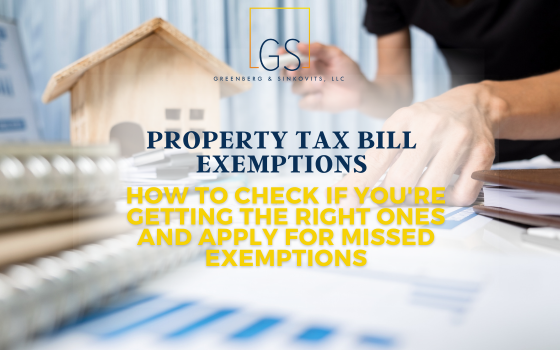The second installment of Cook County’s 2023 Property Tax bills were recently sent out, making it an excellent time to review your exemptions!
Most counties in Illinois, including Cook County, offer property tax exemptions for homeowners who meet certain qualifications. Eligibility depends on factors such as the applicant’s primary residence, age, income, level of disability, or service in the armed forces. These exemptions can significantly lower your bill, so it’s worth checking to ensure you’re receiving all that you’re eligible for.
Where to Find Exemptions on Your Tax Bill
Your property tax bill will list any exemptions applied to your property. Your exemption savings will be listed in the bottom left corner of the bill in the “Tax Calculator” section. Here, you should see line items for each exemption you qualify for.
Checking Your Exemptions Online
You can check your exemptions online through the Cook County Assessor’s Office website:
- Visit the Assessor’s Office Website: Go to the Cook County Assessor’s Office website.
- Property Search: Use the property search tool to find your property by entering your Property Index Number (PIN) or address.
- View Exemptions: Once you locate your property, you will see a detailed breakdown of your property’s assessments and any exemptions applied.
Property Tax Exemptions in Cook County
Cook County offers several property tax exemptions, including:
- Homeowner Exemption (also known as Homestead Exemption): Most homeowners are eligible if they own and occupy the property as their principal residence. Once applied, the Assessor’s Office automatically renews this exemption each year.
- Senior Citizen Exemption: Available to homeowners aged 65 or older who own and occupy their property as their principal residence. This exemption is automatically renewed annually by the Assessor’s Office.
- Senior Freeze Exemption: For homeowners who meet the requirements for the Senior Citizen Exemption and have a total household annual income of $65,000 or less. This exemption must be refiled annually.
- Disabled Persons’ Exemption: Homeowners must be disabled or become disabled during the tax year. This exemption is automatically renewed.
- Returning Veterans’ Exemption: Provides a reduction in the equalized assessed value (EAV) for veterans returning from active duty in armed conflict, applicable for each taxable year in which they return. This exemption must be filed annually.
- Disabled Veterans’ Exemption: Provides a reduction in the EAV for veterans with a service-connected disability as certified by the U.S. Department of Veteran Affairs. The deduction amounts depend on the level of disability and must be filed annually.
- Longtime Homeowner Exemption: Available to homeowners who meet income and residency requirements and have a significant assessment increase that exceeds state-set maximum amounts. Applications are mailed directly to potentially eligible homeowners and must be filed annually. (Only 2% of homeowners in Cook County qualify for this exemption.)
- Home Improvement Exemption: Allows homeowners to add improvements to their home that increase its value (such as increasing the building’s square footage or repairing after structural flood damage) without being taxed on up to $75,000 of the added value for up to four years. This exemption automatically renews for up to four years, and no application is required. The Assessor’s Office automatically applies this exemption to eligible properties.
To find out more about each of these exemptions, visit www.cookcountyassessor.com/exemptions.
Missed Exemptions from Prior Tax Years?
If an exemption was not applied to your 2023 Second Installment Property Tax Bill, you can apply for a Certificate of Error. Here’s how:
- Identify the Missed Exemption: Review your property tax bill to determine which exemption(s) you missed.
- Submit a Certificate of Error Application: Visit the Cook County Assessor’s Office website to apply online or download the Certificate of Error application form. Complete the form and attach any necessary documentation, such as proof of eligibility.
- File by the Deadline: Submit your application by the deadline to ensure a corrected tax bill. If your bill has already been paid, you will receive a refund from the Treasurer’s Office.
Just Bought a Home?
New homeowners in Cook County should be aware of the following steps to ensure they receive all eligible exemptions:
- Receive Application for Exemptions: New eligible property owners will automatically receive applications for the homeowner exemption. Check your mail carefully and apply by the deadline for that tax year (usually late spring).
- Review Your Tax Bill: Carefully review the second installment tax bill mailed by the Treasurer’s Office. Ensure all applicable exemptions are listed.
- Apply for a Certificate of Error: If you don’t see the exemptions you’re eligible for, apply for a Certificate of Error to correct the oversight.
Final Thoughts
By staying proactive and informed, you can ensure you’re receiving all the property tax exemptions you’re entitled to, significantly reducing your tax bill. Regularly review your property tax bill, apply for any missed exemptions, and stay up-to-date on application deadlines. For new homebuyers, taking these steps early on will help you maximize your savings and avoid potential issues.
If you have any questions or need assistance, don’t hesitate to reach out to the Cook County Assessor’s Office or a local tax professional.
Disclaimer: This article provides general information and should not be considered legal advice.






